Higuchi, Susaki reign supreme as two Olympic champs tumble
Saturday, December 24, 2022 - 16:16 By Ken Marantz

TOKYO (December 24) -- On a day that saw two of her fellow Tokyo Olympic champions tumble to defeat, Yui SUSAKI remained as rock steady as always, while Rei HIGUCHI gave his ambitions for an elusive Olympic gold a further boost.
Susaki continued her dominance of Remina YOSHIMOTO, who held the national and world titles in her absence, cruising to an 8-0 victory in the women's 50kg final at the Emperor's Cup All-Japan Championships on Saturday in Tokyo for her first title since 2019.
Higuchi, coming off winning his first world title at freestyle 61kg, defeated Asian bronze medalist Rikuto ARAI 8-4 to regain the national title at 57kg, the weight class in which he won a silver medal at the 2016 Rio Olympics that he is looking to better in Paris in two years.
Meanwhile, a highly anticipated clash between Olympic champion Mayu SHIDOCHI and 2021 world champion Akari FUJINAMI at women's 53kg was put on hold after world 55kg champion Haruna OKUNO crashed the party by beating Shidochi for the first time in 10 career meetings.
Yukako KAWAI became the second Olympic casualty when the gold medalist at women's 62kg was overwhelmed in the semifinals by world 59kg bronze medalist Sakura MOTOKI, who earned a meeting in the final with reigning world champion Nonoka OZAKI.
Takuto OTOGURO, ending a long hiatus with his first competition since winning the Olympic gold at freestyle 65kg, avoided the upset bug by storming into the final with a pair of 10-0 technical falls. Like Susaki and Higuchi, his last national title came in 2019.
For the top wrestlers, the tournament at Tokyo's Komazawa Gym is serving as the first of two domestic qualifying tournaments for next year's World Championships in Belgrade, where the first spots in the 2024 Paris Olympics will be up for grabs.
A medal in an Olympic weight won by a Japanese in Belgrade means an automatic ticket to Paris, thus adding urgency to making the team. Those who lose at the Emperor's Cup will get another shot in June at the Meiji Cup All-Japan Invitational Championships.

Susaki, whose close call with nearly missing out on the Tokyo Olympics has been well documented, is determined to be in Paris to defend her title and is leaving nothing to chance. As she has done throughout this history-making year, on Saturday she wrestled calmly and decisively, taking advantage of every opportunity and not giving her opponent any openings.
"This is the first step in the qualifying process for the Paris Olympics, and I was able to achieve what I set out to do," Susaki said.
Unlike her typical matches in which she gets a takedown and then rips off four straight lace-lock rolls for a quick victory, Susaki scored all of her points in different ways against Yoshimoto, who had ascended to the national throne in 2020 and 2021 that Susaki had abdicated.
Susaki started with a takedown off a single-leg for a 2-0 lead, then added four points with a counter lift and a gut wrench to go into the break up 6-0. In the second period, Susaki forced a stalemate from a Yoshimoto shot, then spun behind after countering another in the final seconds for her final takedown. She had now beaten Yoshimoto in all five of their career matches.

It was a much cleaner and well-executed victory than her 4-2 win over Yoshimoto in the final of the Meiji Cup last June, which remains the only time Susaki has been scored upon in her last 23 matches dating back to early 2021.
"At the Meiji Cup, I watched for the opponent to make a move and didn't stay on the attack to the end, which I regretted," Susaki said. "This time, I kept attacking, so I feel I've cleared that issue."
Susaki, who this year regained the world title she had previously won in 2017 and 2018 in September in Belgrade, also picked up the only major title missing from her collection a month later by capturing the world U23 gold. That completed an unprecedented "Grand Slam" of Olympic gold and all four age-group titles.
Asked about the pressure of Olympic qualifying, she replied, "I don't feel tension. Like before the Tokyo Olympics, I feel more excited that the qualifying for the Olympics has started."
Susaki said she watched the other Olympic champions fall on a monitor in the warmup room, and that it makes her more determined to maintain her focus on the journey ahead.
"The younger wrestlers and others all have their own goals and have been making progress in trying to achieve them," Susaki said. "It makes me feel I have to keep trying even harder and aim higher."

Higuchi's victory in the 57kg final, which gave him his fourth career title, was noteworthy in that his opponent spent about half of the match on his back, a credit perhaps to him that he could avoid the fall. The two often practice together at Nippon Sport Science University, where they are both alumni.
Early in the match, Higuchi caught Arai in a cradle to his back, then switched it to a Turk ride with a cross-face. For more than two minutes, Arai managed to keep a shoulder off the mat until he was saved by the buzzer ending the period.
Higuchi added a takedown off a counter to go up 6-0. But Arai, who had knocked off 2021 world 61kg bronze medalist Toshihiro HASEGAWA in the quarterfinals, came back to life with a counter lift and gut wrench to cut the lead to two.
Higuchi then put the match away with a single-leg attack to exposure, from which he again went to the Turk ride and cross-face and held Arai on his back for the final 1:10 of the match.
"This is the first of the tournaments that I have to win out at, but I went in with the feeling of being the challenger and stayed relaxed and stayed aggressive," Higuchi said. "In the final, after I gave up points I immediately came back and scored myself. I give myself a passing grade for the effort."
For Higuchi, the effort involves a battle with the scale. He famously failed to make weight for the Asian Olympic qualifying tournament, which indirectly led to him missing out on the Tokyo Games.
When it comes to strength and skill, he said he feels he showed he could more than hold his own by winning the world title in the heavier weight class.
"Losing weight is tough," he said. "I was able to win the world title at 61kg. I showed I had the power and technique to be No. 1 in the world. I think I brought that to 57kg."
In other finals, 2021 world bronze medalist Sae NANJO followed up her semifinal victory over world champion Tsugumi SAKURAI by regaining the women's 57kg title with a victory over Asian 59kg champion Sara NATAMI.
Leading 1-0 in the second period, Nanjo countered a single-leg shot by Natami by slapping a cradle on her, then twisted her onto her back for a fall in 4:01. The victory gave Nanjo her fourth career title and first since 2020.

Collegian Kyotaro SOGABE finally reached the pinnacle that has been expected of him since his days as a high school star, beating defending champion and senior training partner Katsuaki ENDO 9-3 for the gold in Greco 67kg.
Sogabe led 3-1 when he came up on top in a late second-period scramble, then added a pair of gut wrenches to avenge a loss in the Meiji Cup final last June to Endo, an Asian bronze medalist this year and 2018 world U23 champion.
A junior at Endo's alma mater of Nippon Sports Science University, Sogabe finished second at this year's Wladyslaw Pytlasinski Cup in Warsaw, which he followed with a world U20 bronze medal.
Not bad for a wrestler who won three national high school titles despite the fact that his high school in rural Ehime Prefecture did not have a team, forcing him to practice at another school.

Otoguro, Fujinami cruise
Following the Tokyo Olympics, Japan's medalists all took some time off before gradually returning to the mat. Otoguro was the last one to end his hiatus, and his performance Saturday made it look like he had never been away.
And technically speaking, he wasn't. He may not have been competing, but he was still practicing hard as a member of the Self-Defense Forces Physical Training School team.
"In the past, I've gone a year or two without a competitive match, and then suddenly came back," said Otoguro, who has endured his share of injuries. "Because of that experience, it wasn't like there was anything different than usual this time. Instead of matches, I'm practicing every day. So I've got a solid foundation."
In the semifinals, Otoguro easily defeated Kaiji OGINO -- a student at Otoguro's alma mater of Yamanashi Gakuin University -- by 10-0 technical fall in 1:49 to advance to the final against world U23 bronze medalist Ryoma ANRAKU.
Fujinami is also returning from a layoff, although hers was unforced as injuries forced her to skip both the senior worlds and the world U23. She said she has completely recovered, and showed it with back-to-back technical falls to advance to the women's 53kg final against Okuno.
"It was my first match in four months, and I feel I've got my mat sense back leading into tomorrow," said Fujinami, whose victories extended her current winning streak to 105 matches that includes those in the run to the 2021 senior world title.
The 19-year-old Fujinami has beaten Okuno in all three of their previous encounters, most recently a 4-0 victory in the final at last June's Meiji Cup.

But Okuno, a two-time senior world champion who added a third world U23 gold this year, showed she might be a different wrestler than before with her stunning win over Shidochi.
In a match that saw only a few shots, all defended well by both wrestlers, Okuno defeated Shidochi 3-1 with all but one point scored on the activity clock. Okuno was on the receiving end of two of them, then clinched the match when Shidochi stepped out while having Okuno in a front headlock with :32 left.
Neither wrestler made themselves available to the media after the match.

Kawai also wouldn't offer any comments on her one-sided loss to Motoki, who stormed to a 9-2 victory in which all of the points were scored in the first period.
Motoki opened with a pair of takedowns, then added two two-point exposures from a chicken wing hold. Kawai had a chance to snatch a victory when she put Motoki on her back during a scramble, but Motoki squirmed free and scored a reversal.
When the final buzzer sounded, Kawai dropped to her knees, having apparently suffered a left leg injury sometime during the bout. She had to be helped off the mat.
The victory earns Motoki a clash with one of Japan's hottest wrestlers, Nonoka OZAKI, who has put together a string of titles this year that include the world U20, senior and U23 titles in succession over a three-month span. She also beat Kawai in the Meiji Cup final in June.
The 19-year-old Ozaki's lone loss dating back to August 2017 came in the second round of the 2021 World Championships to eventual champion Aisuluu TYNYBEKOVA (KGZ), a defeat she has since avenged. She advanced to the final on Sunday with a pair of technical falls.
"This is one tournament related to qualifying for the Paris Olympics, so I prepared myself more than I had ever done before and am confident of winning the title," Ozaki said. "My spirit is in sync with my body and I'm moving very well."
As for the unexpected change in her final opponent, she said, "I never concern myself with who the opponent is, only that I do what I need to do. I'm always nervous in a match and have various emotions, but this tournament I'm really enjoying myself, so I have good vibes going."
At Greco 60kg, Olympic silver medalist Kenichiro FUMITA advanced to the final with a 9-0 technical fall over Kosei TAKESHITA as he aims for his fourth career title and first in two years.
He will face Maito KAWANA, who defeated defending champion Ayata SUZUKI in the quarterfinals.
Day 3 Results
Freestyle
57kg (11 entries)
Gold - Rei HIGUCHI df. Rikuto ARAI, 8-4
Bronze - Ryuto SAKAKI df. Toshihiro HASEGAWA, 4-1
Bronze - Yuto NISHIUCHI df. Yuki TAKAHASHI by Def.
65kg (14 entries)
Semifinal - Takuto OTOGURO df. Kaiji OGINO by TF, 10-0, 1:29
Semifinal - Ryoma ANRAKU df. Yujiro UENO, 8-1
70kg (14 entries)
Gold - Yoshinosuke AOYAGI df. Daiju SUZUKI, 8-1
Bronze - Toki OGAWA df. Keitaro ONO, 10-4
Bronze - Taishin YAMAJI df. Ryota UCHIYAMA by Fall, 1:55 (5-0)
Semifinal - Yoshinosuke AOYAGI df. Toki OGAWA, 3-0
Semifinal - Daiju SUZUKI df. Ryota UCHIYAMA, 5-3
79kg (14 entries)
Gold - Yajuro YAMAZAKI df. Kosuke YAMAKURA, 6-0
Bronze - Takahiro MURAYAMA df. Kohei KITAMURA by TF, 10-0, :51
Bronze - Kota ABE df. Kenshin YAMAJI by Def.
Semifinal - Yajuro YAMAZAKI df. Takahiro MURAYAMA, 4-0
Semifinal - Kosuke YAMAKURA df. Kenshin YAMAJI by TF, 12-0, 1:19
86kg (14 entries)
Gold - Hayato ISHIGURO df. Yudai TAKAHASHI, 4-2
Bronze - Taisei MATSUYUKI df. Shota SHIRAI by Def.
Bronze - Fumiya IGARASHI df. Ryuki YOSHIDA by Def.
Greco-Roman
60kg (11 entries)
Semifinal - Kenichiro FUMITA df. Kosei TAKESHITA by TF, 9-0, 1:59
Semifinal - Maito KAWANA df. Yuto GOMI, 7-0
67kg (13 entries)
Gold - Kyotaro SOGABE df. Katsuaki ENDO, 9-3
Bronze - Haruto YABE df. Yuji UEGAKI, 3-1
Bronze - Eito NISHIDA df. Shigeki TSUTSUMI, 5-2
77kg (13 entries)
Gold - Kodai SAKURABA df. Nao KUSAKA by TF, 10-1, 5:43
Bronze - Tatsuya FUJII df. Shohei YABIKU, 3-3
Bronze - Minto MAEDA df. Naoki KADODE by TF, 9-0, 1:56
82kg (12 entries)
Gold - Yuya MAEDA df. Masao TANAKA, 7-5
Bronze - Daizo TANIZAKI df. Muuto SAWADA by TF, 8-0, 4:10
Bronze - Desshin HIGUCHI df. Kiriru SHIMABUKURO, 9-5
Semifinal - Masao TANAKA df. Muuto SAWADA, 9-4
Semifinal - Yuya MAEDA df. Kiriru SHIMABUKURO by TF, 9-0, 3:33
Women
50kg (16 entries)
Gold - Yui SUSAKI df. Remina YOSHIMOTO, 8-0
Bronze - Umi ITO df. Nanami IRIE by TF, 10-0, :48
Bronze - Hanano SAKURAI df. Haruna MORIKAWA by TF, 10-0, 2:21
53kg (9 entries)
Semifinal - Akari FUJINAMI df. Mako ONO by TF, 10-0, :28
Semifinal - Haruna OKUNO df. Mayu SHIDOCHI, 3-1
57kg (10 entries)
Gold - Sae NANJO df. Sara NATAMI by Fall, 4:01 (5-0)
Bronze - Tsugumi SAKURAI df. Ibuki TAMURA by Def.
Bronze - Yumeka TANABE df. Umi IMAI, 6-4
62kg (11 entries)
Semifinal - Nonoka OZAKI df. Nayu UCHIDA by TF, 10-0, 3:57
Semifinal - Sakura MOTOKI df. Yukako KAWAI, 9-2

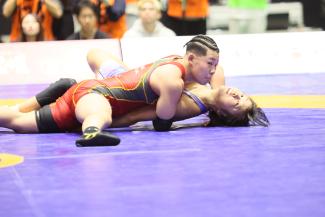
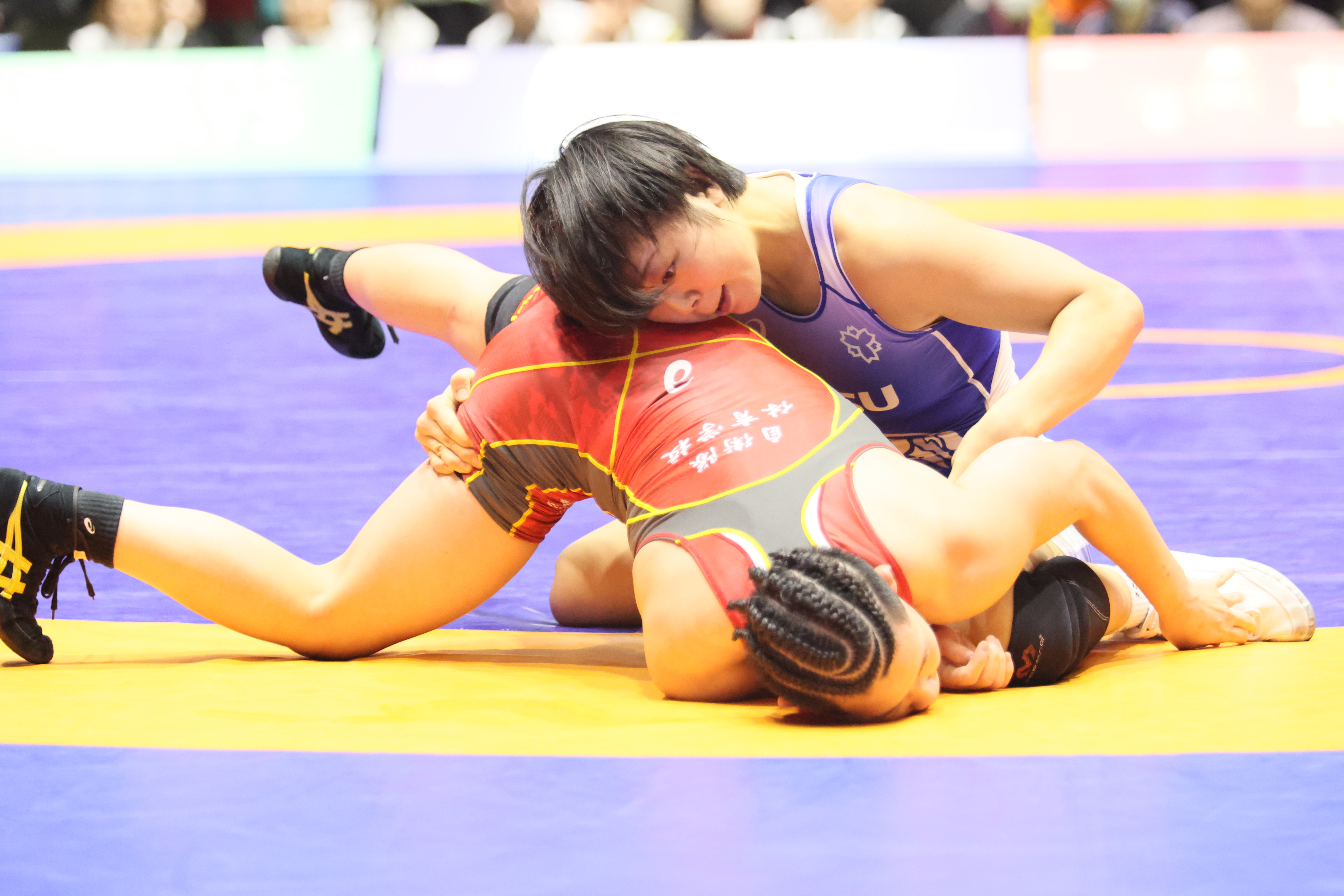 Akari FUJINAMI finishes up the winning takedown against Himeka TOKUHARA in the final minute of the women's 57kg final. (Photo: Takeo Yabuki / wrestling-spirits.jp)
Akari FUJINAMI finishes up the winning takedown against Himeka TOKUHARA in the final minute of the women's 57kg final. (Photo: Takeo Yabuki / wrestling-spirits.jp)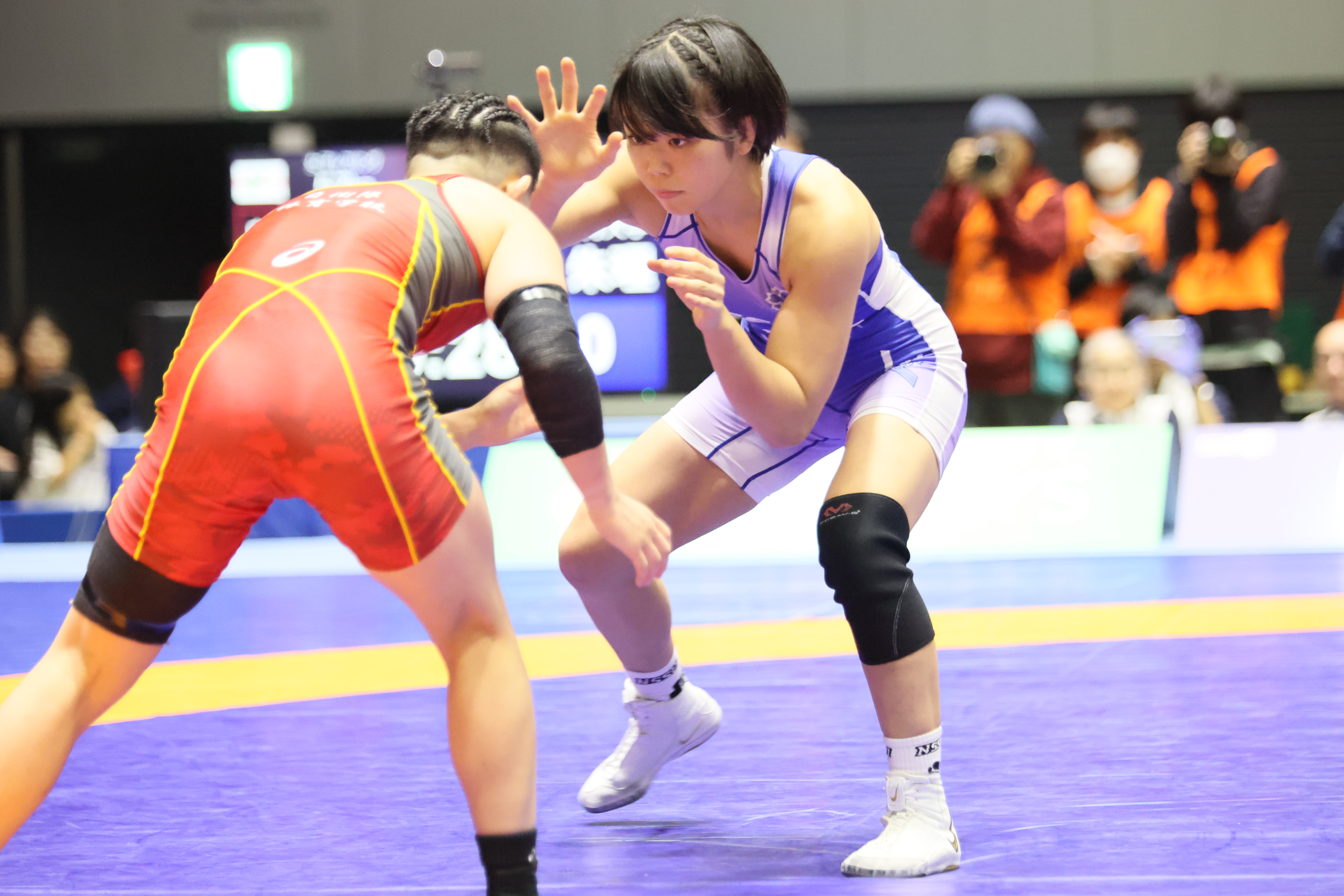 Akari FUJINAMI squares off with Himeka TOKUHARA in the women's 57kg final. (Photo: Takeo Yabuki / wrestling-spirits.jp)
Akari FUJINAMI squares off with Himeka TOKUHARA in the women's 57kg final. (Photo: Takeo Yabuki / wrestling-spirits.jp)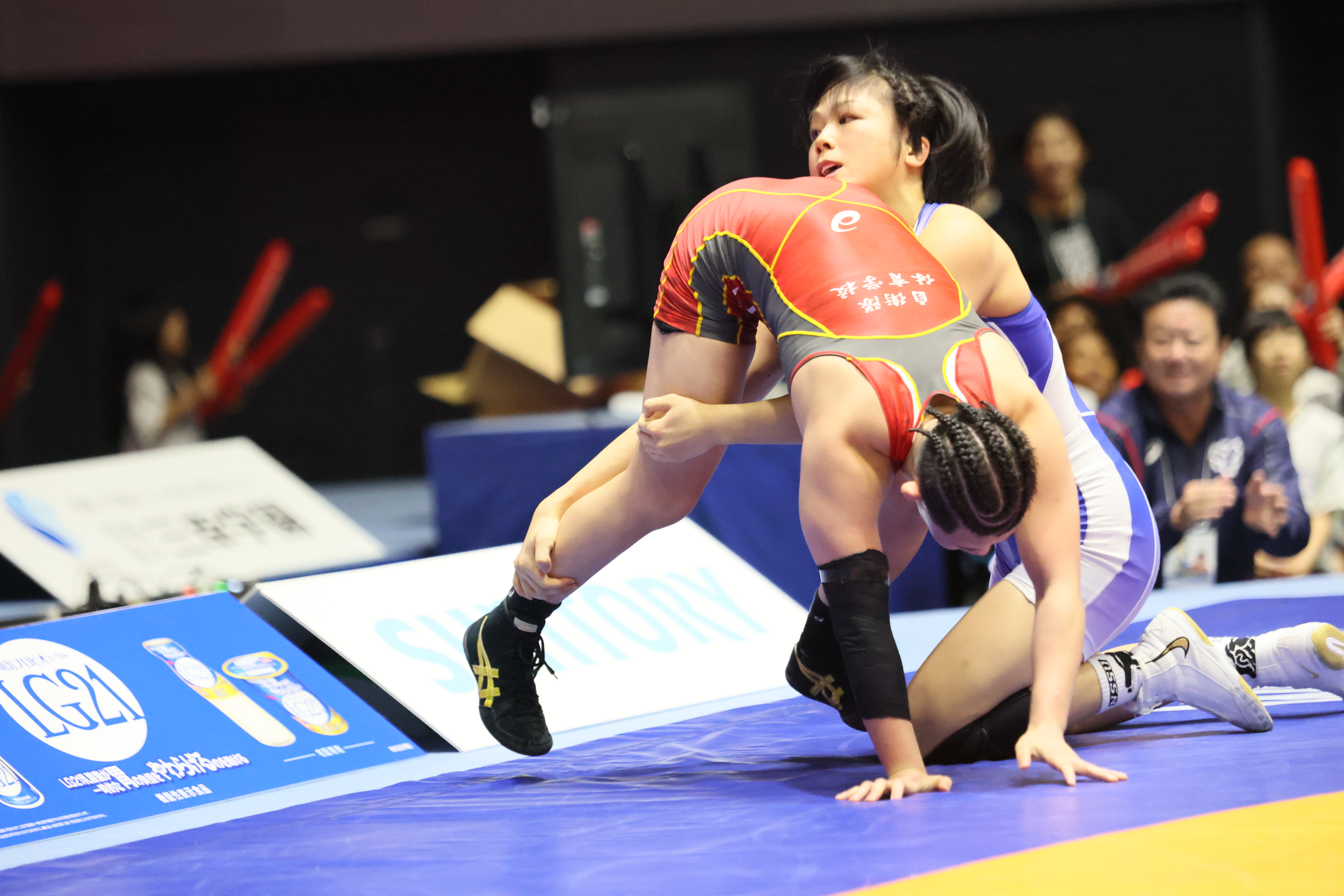 Akari FUJINAMI gets a stepout in the second period of the women's 57kg final. (Photo: Takeo Yabuki / wrestling-spirits.jp)
Akari FUJINAMI gets a stepout in the second period of the women's 57kg final. (Photo: Takeo Yabuki / wrestling-spirits.jp)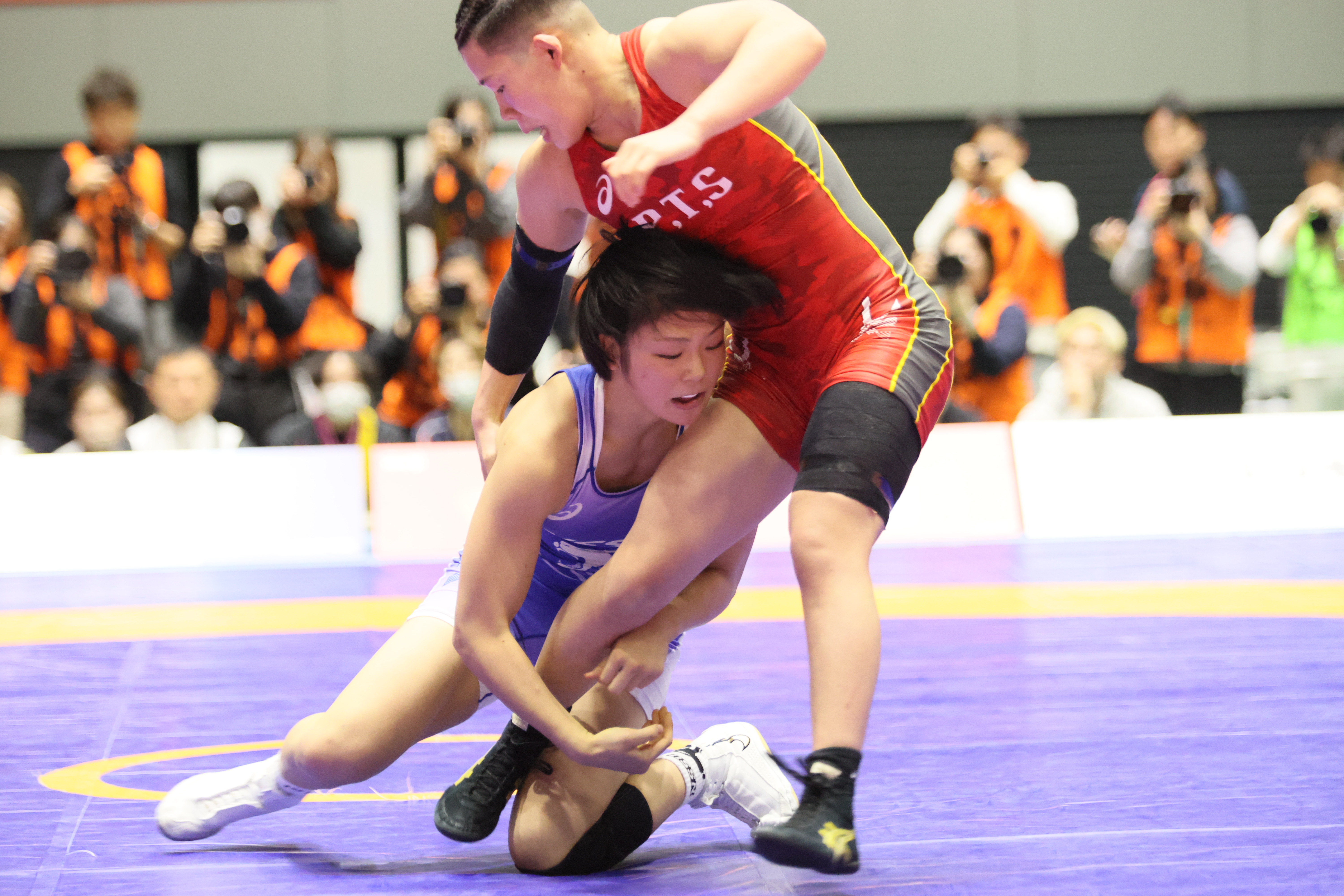 Akari FUJINAMI shoots for the winning takedown against Himeka TOKUHARA in the final minute of the women's 57kg final. (Photo: Takeo Yabuki / wrestling-spirits.jp)
Akari FUJINAMI shoots for the winning takedown against Himeka TOKUHARA in the final minute of the women's 57kg final. (Photo: Takeo Yabuki / wrestling-spirits.jp)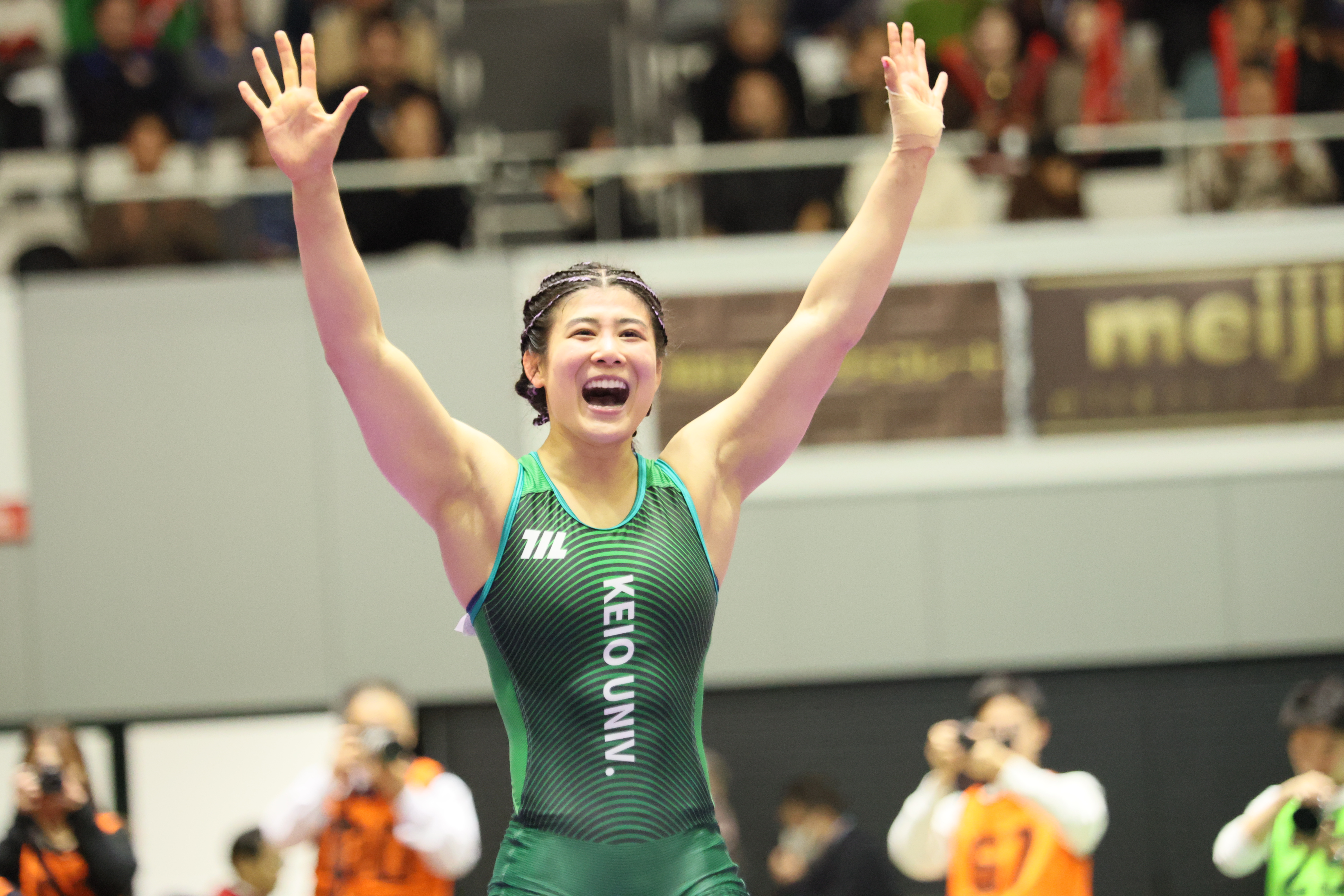 Nonoka OZAKI celebrates her victory over nemesis and Olympic champion Sakura MOTOKI in the women's 62kg final. (Photo: Takeo Yabuki / wrestling-spirits.jp)
Nonoka OZAKI celebrates her victory over nemesis and Olympic champion Sakura MOTOKI in the women's 62kg final. (Photo: Takeo Yabuki / wrestling-spirits.jp)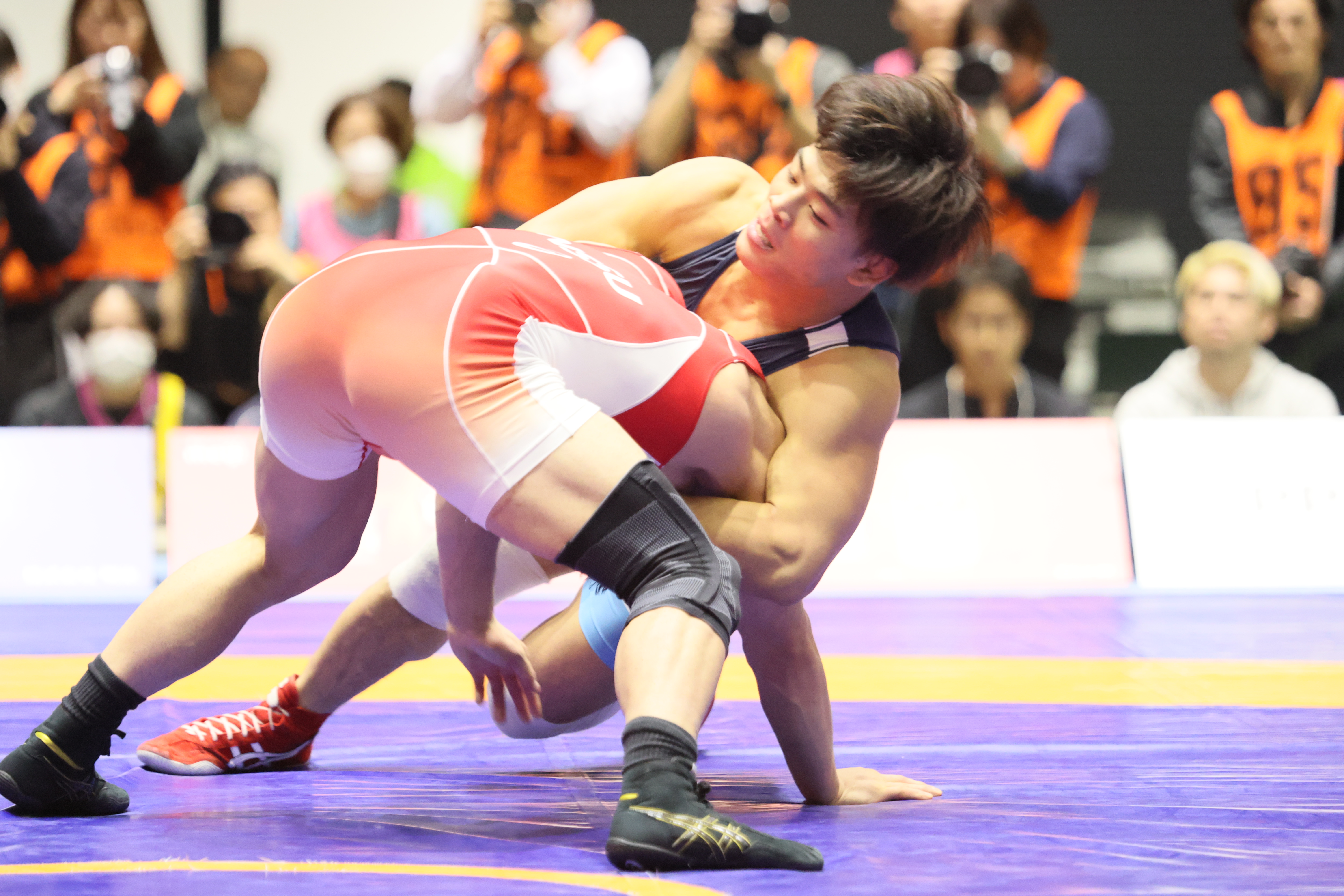 Yoshinosuke AOYAGI unsuccessfully attempts a front body lock roll in the freestyle 74kg final against Kota TAKAHASHI. (Photo: Takeo Yabuki / wrestling-spirits.jp)
Yoshinosuke AOYAGI unsuccessfully attempts a front body lock roll in the freestyle 74kg final against Kota TAKAHASHI. (Photo: Takeo Yabuki / wrestling-spirits.jp)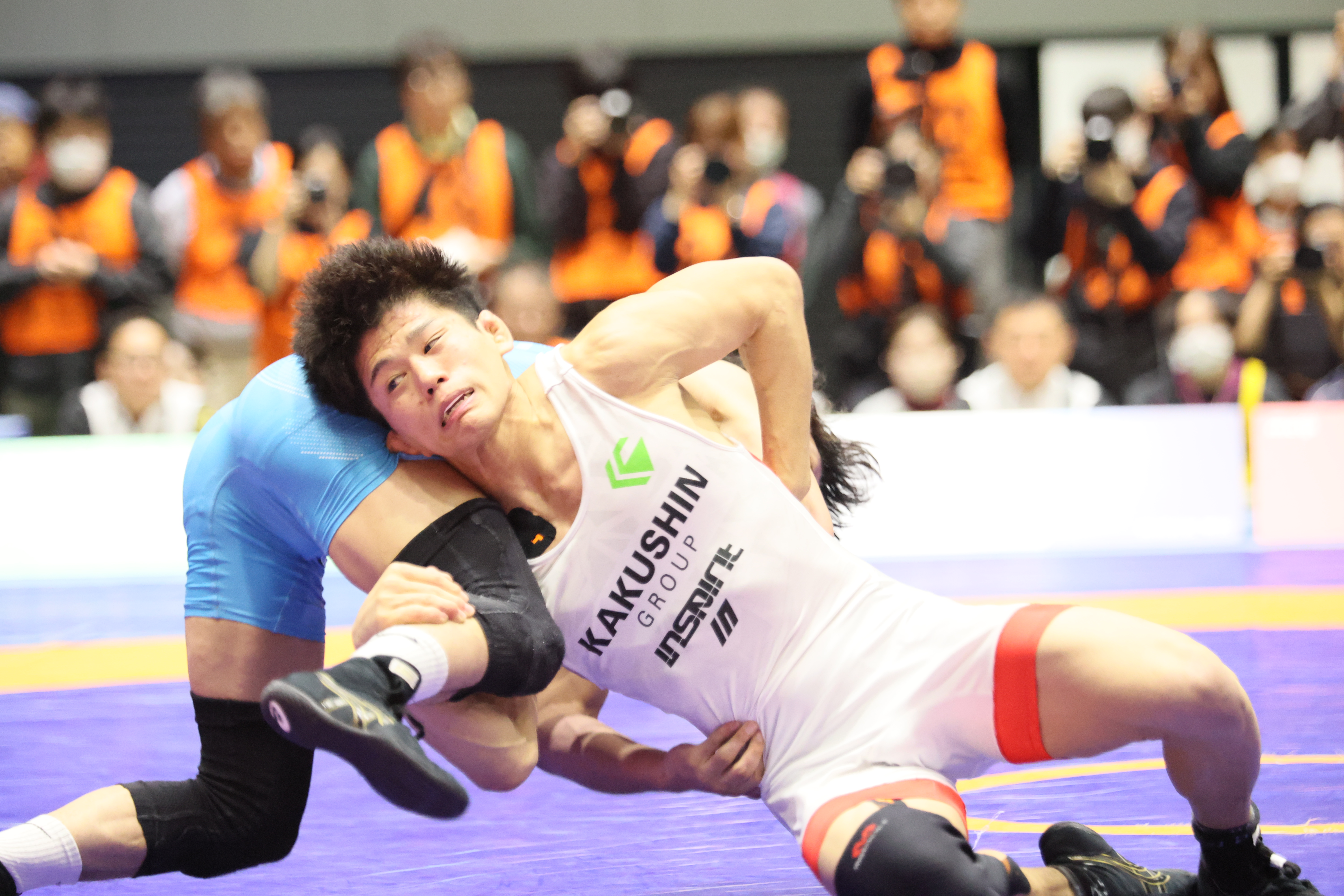 Kotaro KIYOOKA sweeps to the side for a takedown against Takara SUDA in the freestyle 65kg final. (Photo: Takeo Yabuki / wrestling-spirits.jp)
Kotaro KIYOOKA sweeps to the side for a takedown against Takara SUDA in the freestyle 65kg final. (Photo: Takeo Yabuki / wrestling-spirits.jp)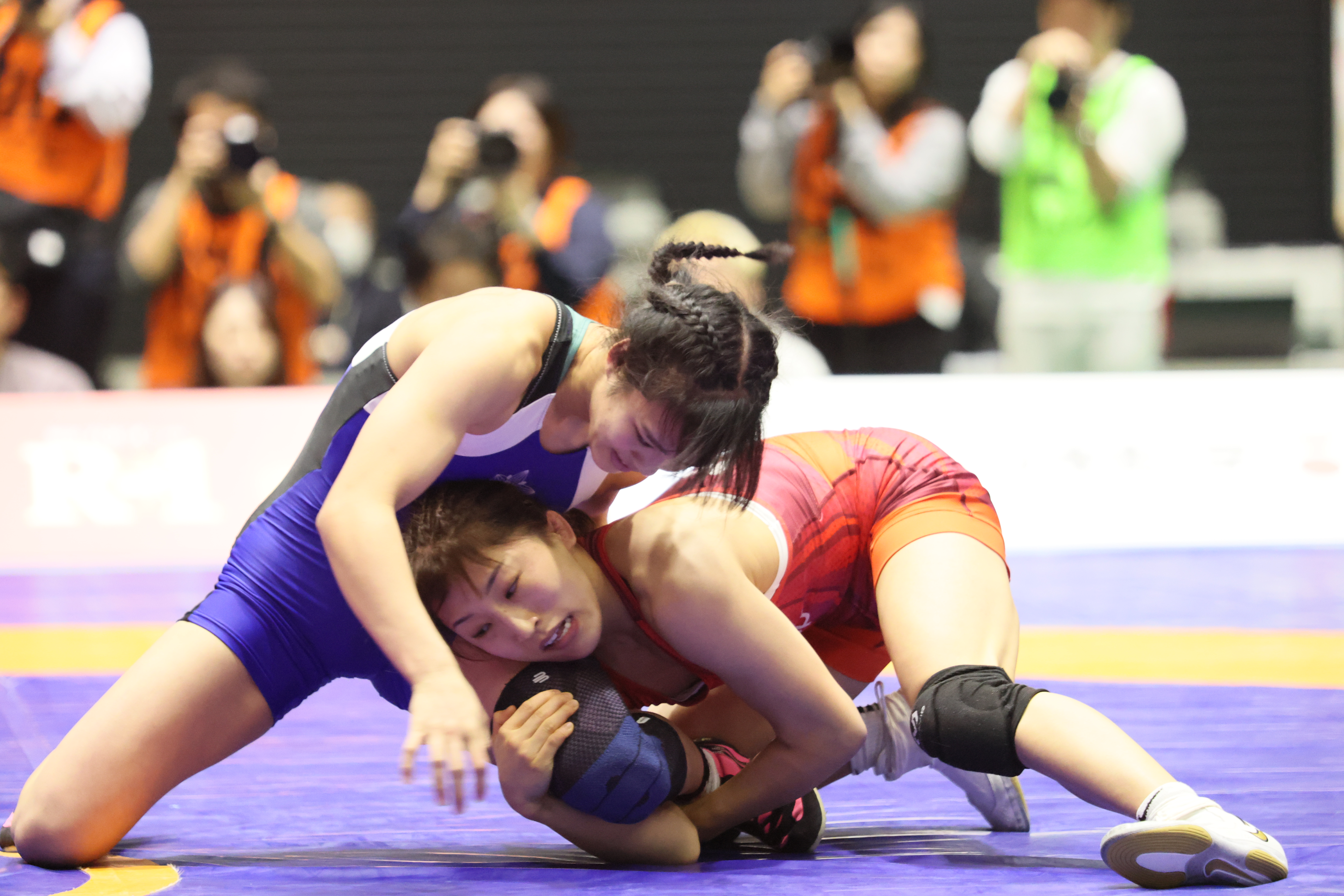 Yui SUSAKI shoots for a takedown against Haruna MORIKAWA in the women's 50kg final. (Photo: Takeo Yabuki / wrestling-spirits.jp)
Yui SUSAKI shoots for a takedown against Haruna MORIKAWA in the women's 50kg final. (Photo: Takeo Yabuki / wrestling-spirits.jp)
Share your thoughts.
Comments